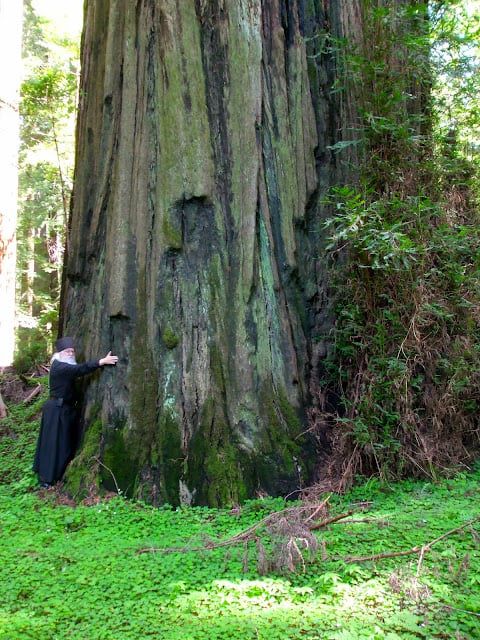Humans are as Priests before the Altar of Creation
Everything that lives and breathes is sacred and beautiful in the eyes of God. From the heart of our Orthodox faith, the whole world is a sacrament, and the entire created cosmos is a burning bush of God’s uncreated energies. All of humanity stands as priests before the altar of creation, as microcosms and mediators. Such is the true nature of things; or, as an Orthodox hymn describes it, “the truth of things,” if only we have the eyes of faith to see it.
These words ring true to me as a man who has always loved the outdoors. Some of my earliest memories are the camping trips we would take, as a family, pitching a tent by an idyllic lake in Northern Idaho, cooking over a fire, catching rainbow trout for breakfast (nothing like a freshly grilled trout for breakfast), and hiking mountain trails. When in high school I’d join friends for day-long hikes in the nearby mountains, or go swimming in remote areas of Lake Pend Oreille, Idaho’s largest lake.
At 65 miles long, and located in the northern panhandle of the State, it is the fifth deepest lake in the United States, measuring 1,150 feet deep in some areas. The lake’s 111 miles of uncrowded shoreline, permitted many an adventure, and instilled in me a love of nature, and the great outdoors. The waters of this lake are so pure, many people who have built homes on the lake’s many islands, simply pipe their water from the lake, with no treatment necessary.
Every Summer, I try to get away for a few days of bass fishing with my brother, Dwayne, boating up the Clark Fork River, a tributary of Lake Pend Oreille. We feel like our Viking ancestors, as we move ever deeper into wilderness, entering the remote territory of moose, elk, bear, and eagles. We both consider ourselves environmentalists, and as stewards of the natural resources God has given us.
The Redwoods of Northern California are another special place for me. These towering giants have beckoned me since I first entered this primordial forest back in the late 1960’s. One Redwood tree is particularly special to me, for it was the first tree I ever hugged (yes, I’m a tree hugger), and I’ve made it a point to hug that very tree since I was twenty-two, and have photographed many a friend embracing that tree, including fellow priests who will remain anonymous.
Orthodoxy has never viewed the environment, nor the natural resources, as something worthy of plunder. Orthodoxy has historically viewed the earth as a place to be nurtured, protected, and preserved for future generations. The vast areas of Russia that were plundered and laid waste, happened under the godless Soviets. The great forests that surrounded Athens and Thessaloniki, cities built by Greeks using stone for construction, were cut down by the Turks, who built only with wood.
Our Church has special supplications and litanies for “seasonable weather, for abundance of the fruits of the earth” or for protection in the case of natural disasters. There is even a special prayer from the service said in times of danger from earthquake:
“The earth is without words, yet groans and cries: ‘Why, all people, do you pollute me with so many evils? The Master spares you but chastises me entirely: understand and propitiate God in repentance.'”
Orthodoxy conveys a profound understanding of creation, and the role of humanity as the priesthood of creation. As creatures who are able to alter and reshape the world, we are bound by the Creator to be good stewards. As the whole of the cosmos has worshiped the Creator, we have built churches that represent a microcosm of this very universe. The promise of redemption is for all of creation, and is the gift of salvation wrought by Jesus Christ.
With love in Christ,
Abbot Tryphon
Photo: I’ve been hugging this Redwood tree every time I drive through the Avenue of the Giants in Northern California, since I was 22 years old. Fifty-three years hugging a tree must say something about me, but I’m not going there….
Great-martyr Euphemia the All-praised, of Chalcedon (304).
New Hieromartyr Gregory Raevsky priest (1937).
New Hieromartyr Sergius priest (1942).
Translation of the relics of St. Alexis of Moscow (2001).
Repose of St. Cyprian, metropolitan of Kiev (1406).
St. Photius, metropolitan of Kiev (1431).
St. Kushka of Odessa confessor (1964).
St. Sebastiana, disciple of St. Paul the Apostle, martyred at Heraclea (86).
Martyr Melitina of Marcianopolis (2nd c.).
Martyrs Victor and Sosthenes at Chalcedon (304).
Venerable Dorotheus, hermit of Egypt (4th c.).
Martyr Ludmilla (927), grandmother of St. Wenceslaus, prince of the Czechs.
Venerable Procopius, abbot, of Sazava in Bohemia (1053).
New Martyrs Isaac and Joseph, who suffered at Karnu, Georgia (808) (Georgia).
The Icon of the Mother of God, named “Support of the Humble” (1420).
St. Ninian, bishop of Whithorn (Candida Casa) ( 432) (Celtic & British).
Venerable Edith, nun, of Wilton, England (984) (Celtic & British).
Venerable Cyprian of Serbia (Serbia).
Galatians 3:15-22
Mark 6:7-13

